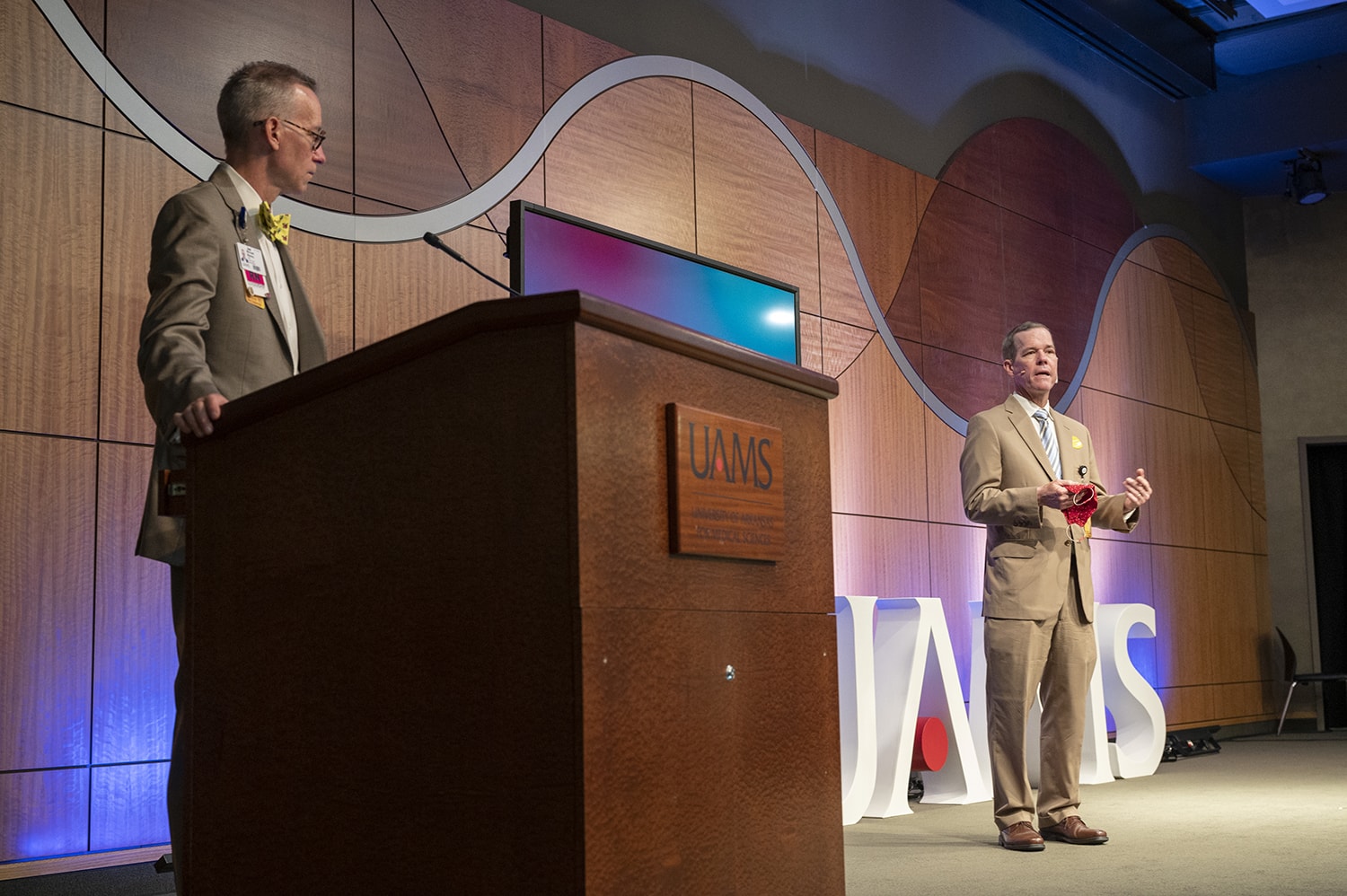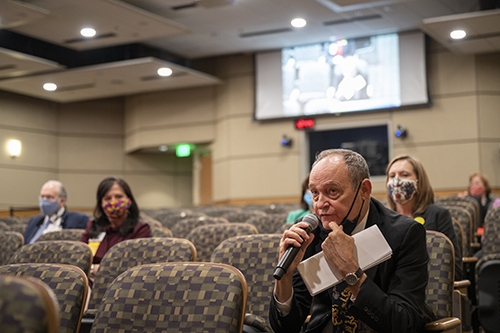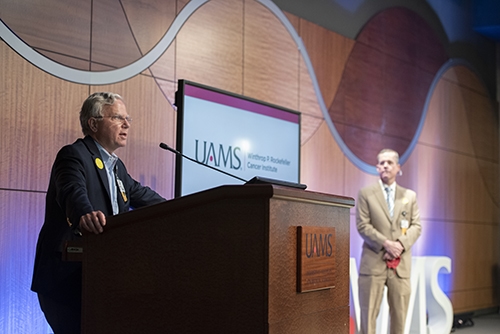View Larger Image

Chancellor Cam Patterson, right, responds to a question asked by Michael Manley, left, who fielded questions from the online audience.
Image by Evan Lewis
COVID-19, Cancer Institute’s Growth among Topics at June Town Hall
| UAMS Chancellor Cam Patterson, M.D., MBA, at the virtual Town Hall meeting June 16 introduced five speakers who each addressed a variety of subjects from COVID-19 research to recruitment, clinical volumes and construction.
Patterson started off the meeting by thanking a new arrival to the university.
“As you know my wife and kids and I love being here in Arkansas, and on June 1, we celebrated our third year as Arkansans,” he said. “This year on June 1, we had a new member of senior leadership join us. We are so happy to have Susan Smyth here as our new dean of the College of Medicine.”

Michael Birrer answers an online question while seated with the other speakers and officials attending the Town Hall in Smith Auditorium. Unless speaking, all participants were masked and socially distanced.Image by Evan Lewis
In addition to being the new dean, Smyth, M.D., Ph.D., also will serve as executive vice chancellor. She succeeds Christopher Westfall, M.D, who will continue to work as the transitional dean until he retires Aug. 1.
Michael Birrer, M.D., Ph.D., Winthrop P. Rockefeller Cancer Institute director and vice chancellor, briefed the audience on progress in the institute’s efforts to earn National Cancer Institute Designation. About 68 percent of the funds awarded by the National Cancer Institute for research and clinical trials goes to NCI-Designated centers.
“Despite the COVID-19 pandemic, the team has really done a lot of heavy lifting over the last year,” Birrer said. “I think you’ll be surprised, if not shocked, at what we have accomplished.”
He said the institute is progressing at a healthy pace toward its goal of cancer research recruitment, and he expects to be “closing in on 20 researchers” by the end of the summer.
The group of new researchers so far represent an array of fields including pathology, radiation oncology, nursing, biochemistry, pediatrics and internal medicine.
“We’re bringing them in to all different departments,” Birrer said “They’re also diverse in terms of career – junior faculty, mid-career and even a few senior faculty who can provide mentoring. They represent diversity in gender and ethnicity and the best in scientific excellence in this country.”
Birrer also noted the opening of the state-of-the-art Breast Center and groundbreaking for a new Radiation Oncology Center.
He said he expects the institute to make available about $1 million for grants in support of pilot research studies, a continuing increase that also is a priority for the National Cancer Institute.
The inaugural 5K “Be a Part of the Cure Walk” drew 600 walkers and raised $140,000 for cancer research at UAMS. Birrer said it far exceeded his expectations and surpassed the number of participants and funds raised in a similar walk he helped organize at a university where he previously worked.

Steppe Mette, left, speaks about COVID-19 infections during the Town Hall. Chancellor Patterson listens while on stage.Image by Evan Lewis
Pearl McElfish, Ph.D., MBA, the Cancer Institute’s associate director of Community Outreach and Engagement, provided the latest information about the institute’s new Navigator Program. The navigators will be at UAMS regional campuses across the state to help patients navigate cancer prevention and treatment services throughout the state. “The thought that I want to leave you with is something Dr. Patterson has said often,” McElfish said. “UAMS’ mission is to serve the whole state. The Navigator Program builds on that commitment.”
Steppe Mette, M.D., Medical Center CEO and senior vice chancellor for UAMS Health, said clinical volumes in the Medical Center are robust, exceeding 2018 volumes although still below those in 2019.
“We are always above 90% of capacity and often at 98%,” Mette said. “We are constrained by space and hobbled by staffing. Staffing is our Achilles heel, and that’s not unique to UAMS. It’s true of Little Rock hospitals, the state and country.”

The sites of several construction projects are shown here: A — new surgical hospital, B — new Radiation Oncology Center and Proton Center, C — new child development center, D — new parking deck, E — potential hotel. At the Town Hall, Christina Clark delivered an update on their progress.
He said COVID-19 is not gone, and hospitalization rates are slowly rising.
“The most concerning thing is the portion of COVID patients who end up in the intensive care unit,” Mette said. “For the first year, we were seeing about 20 to 25% of our hospitalized patients ending up in the critical care units, and it is now 50 to 70%.”
Although Arkansas ranks 49th among states in the percentage of its population that has been vaccinated against COVID-10, a bright spot has been the vaccination of the UAMS workforce, which Mette said is now at 83%, which puts it in the upper tier of employee vaccination rates.
Laura James, M.D., director of the Translational Research Institute, summarized the findings of a COVID-19 antibodies study that was conducted statewide and gathered almost 12,000 blood samples, surpassing its goal of 10,000.
The study in adults, standardized for age, gender and race, showed Arkansas had a 2.6% prevalence with the first wave of the virus, 4.1% with the second and 7.4% by the end of the fall in November-December. Surprisingly, urban areas did not have higher positivity rates, James said. The most striking differences in rates were across communities of color with higher rates among Hispanics and African Americans than among whites.
During a question-and-answer session at the end of the meeting, Mette was asked if COVID-19 vaccination would be required for employment at UAMS.
“I see it in the future but not in the near future,” he said. “There is a statutory limitation in Arkansas on our ability to mandate vaccination. The majority of academic medical centers are moving toward mandatory by September, but we’re not at that point yet.”
Christina Clark, MBA, UAMS chief operating officer who earlier in the meeting provided progress reports on several building projects across campus, answered a question about whether the BioVentures building near one of the sites would be affected. Apart from some noise and vibrations, it won’t, she said.
At the mention of BioVentures, Patterson concluded the meeting by noting the recent death of BioVentures president Nancy Gray, Ph.D.
“Nancy Gray was dedicated to UAMS and committed to innovation in our research enterprise,” he said. “She will be deeply missed. I hope you will keep her and her family in your thoughts and prayers. She was a wonderful person.”
Patterson added that trauma surgeon Kevin Sexton, M.D., will temporarily lead BioVentures while a national search is conducted for Gray’s permanent successor.